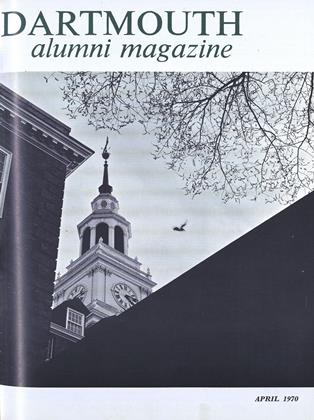IN one of the first major moves of his new administration, President Kemeny last month named a 13-man Commission on the Organization of the Facility - something he had forecast in his March 1 inaugural address. Characterizing the task of the special commission as "extremely important," he instructed the members to "consider the organization of the faculty in the broadest sense" and to present "a set of recommendations for improvements" by March 1, 1971.
President Kemeny expressed specific concern about the existence of four separate faculties at Dartmouth - one in Arts and Sciences and one each at the Medical School, the Thayer School, and the Tuck School - and about the "fragmentation of the Faculty of Arts and Sciences." He said the division of Dartmouth into four separate faculties "negates some of the advantages of a small university." At the same time, he said the growing fragmentation of the Faculty of Arts and Sciences through the creation of new departments makes it "difficult to provide strong continuing leadership for many of the departments" while setting up barriers to the involvement of the faculty in "decisions regarding fundamental priorities of the institution."
"We have too many departments, and the three divisions (Humanities, Social Sciences, and Sciences) now are too large and too heterogeneous," he said, adding that "this has made it difficult to generate imaginative new programs, particularly of an interdisciplinary nature. I would hope that a new organization of the faculty would bring about a single faculty for Dartmouth College, organized into units of reasonable size with strong leadership. Faculty members could then be given considerable power to determine their own future Plans and to help in the allocation of institutional resources.
"I therefore charge the Commission to consider the organization of the Faculty in the broadest sense. It should consider the organization of faculty members into faculties, divisions, departments, and programs. It should raise the question of the viability of the present Executive Committee of the Faculty and meetings of the faculty as a whole. For example, should a Faculty Senate be created?"
He also urged the commission to consider the relation between organization and academic programs and even the structure of the academic administration. He proposed that the commission appoint task forces to investigate various elements of the total problem and called specifically for "significant representation" on the task forces of junior faculty members. He also stressed that the task forces then "should consider the best means for obtaining student opinion on matters of particular concern to the student body."
Members appointed to the commission are: Biology Professor John H. Copenhaver Jr. '46, chairman; Dr. Ralph W. Hunter '31 of Hanover, a member of the Board of Trustees; Provost Leonard M. Rieser '44; Lawrence E. Harvey, newly appointed Dean of the Faculty of Arts and Sciences; Dr. Carleton B. Chapman, dean of the Medical School; John W. Hennessey Jr., dean of the Tuck School; William P. Davis Jr., acting dean of the Thayer School; Fred Berthold Jr. '45, Professor of Religion; James A. Davis, Professor of Sociology; Donald L. Kreider, Professor of Mathematics; John T. Lanzetta, Professor of Psychology; and Government Professor Frank Smallwood '51, Associate Dean of the Faculty of Arts and Sciences for the Social Sciences. Mrs. Richard Sterling, research assistant to President Kemeny, will serve as clerk of the commission.
 View Full Issue
View Full Issue
More From This Issue
-
 Feature
FeatureThe Dilemma of World Power
April 1970 By GENE M. LYONS, -
 Feature
FeatureRevival of the M.D. Degree
April 1970 -
 Feature
FeatureTHE KEMENY INAUGURATION
April 1970 -
 Feature
FeatureThe National Scene
April 1970 -
 Article
ArticleThe Faculty
April 1970 By WILLIAM R. MEYER -
 Class Notes
Class Notes1935
April 1970 By RICHARD K. MONTGOMERY, GEORGE PRICE







